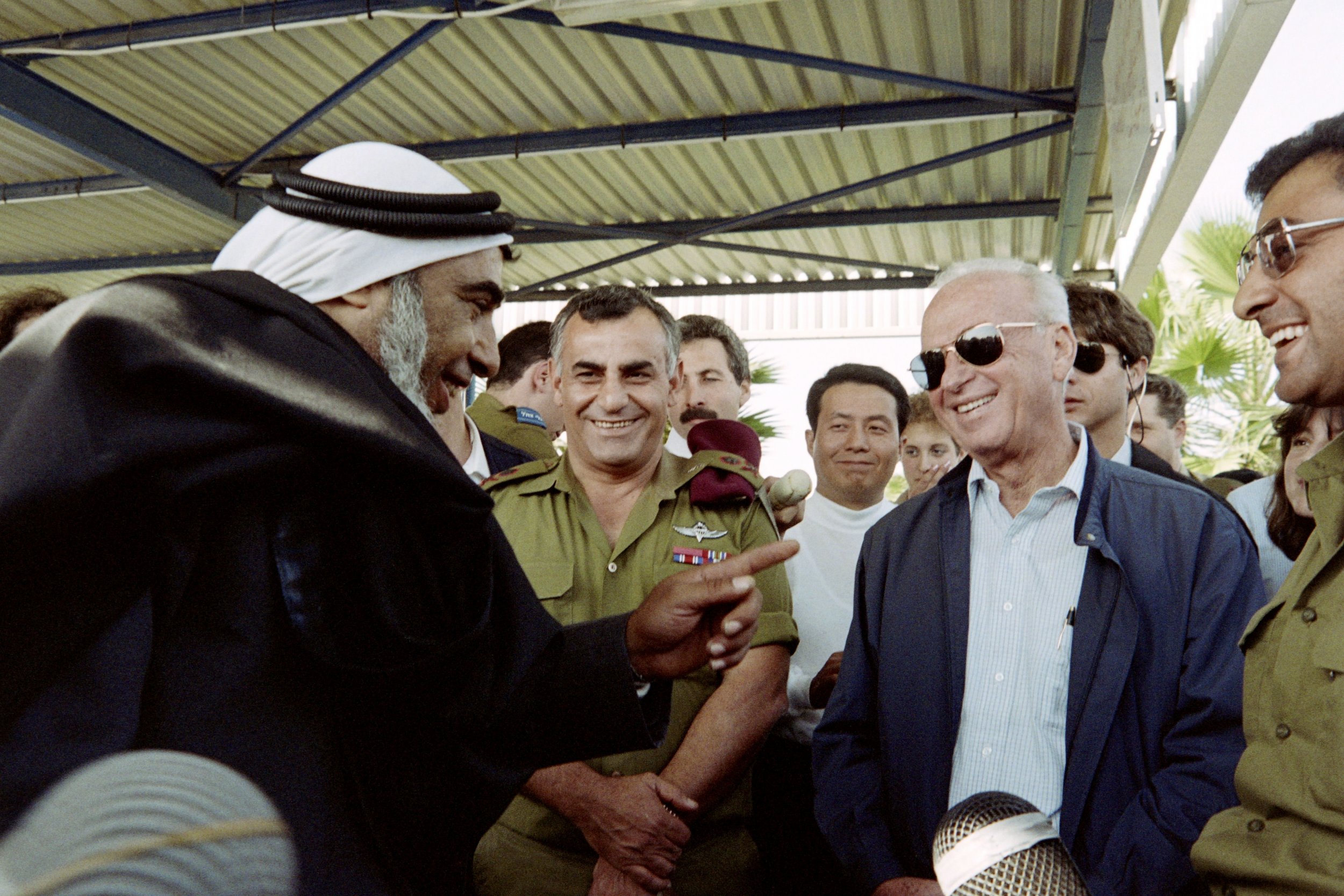
On November 4, 1995, Jewish extremist Yigal Amir assassinated Israeli Prime Minister Yitzhak Rabin, hoping to upend the peace process that had begun two years earlier between the Jewish state and the Palestinian leaders. The killer largely succeeded. The peace process was never the same and two decades after Rabin's murder, the olive branch of peace between Israelis and Palestinians has been replaced by a dagger. The November 13, 1995 issue of Newsweek profiles Rabin's battle for peace in a career that spanned the history of the Jewish state.
Yitzhak Rabin spent his last minutes on earth in a place that made him uncomfortable—the spotlight. He was doing something he did not normally enjoy—speaking to crowds in his wooden cadences, singing a song while all around him held hands. His longtime colleague and political rival Shimon Peres later said, "It was the happiest day," and perhaps it was. With every passing month, it was clearer that for all the violence and all the fear in Israel and the occupied territories, Rabin's policy of gradual reconciliation was not only succeeding; it also had broad popular support. "People really want peace," Rabin said at the Tel Aviv rally last Saturday night, and one of the reasons they wanted peace was that Yitzhak Rabin had come to want it, and brought his compatriots with him.
It was one of many ways in which Rabin embodied his country's history. Born in Jerusalem on March 1, 1922, the child of immigrants from Eastern Europe, he was from boyhood a steadfast Zionist. He was not even out of his teens when he became a commando in Haganah, the Jewish underground army fighting the Axis powers in what was then British-ruled Palestine. After World War II and the formation of the Jewish state, his reputation as a soldier and strategist earned him a place in the Israeli military establishment, where he eventually rose to become chief of staff.
Related: The Murder of Yitzhak Rabin and the Rise of the Blade Intifada
Yom Kippur: In that role, Rabin oversaw Israel's sweeping victory in the Six Day War of June 1967, even as the more charismatic Gen. Moshe Dayan got most of the credit in the Western pres. But Israelis knew the truth: after his prosecution of the war, it was widely assumed that one day Rabin would be defense minister or prime minister. He served a term as Israel's ambassador to the United States, and in 1973 returned to Jerusalem to run for a seat in the Knesset as a member of the Labor Party, just in time to benefit from criticism of other Israeli leaders for military unreadiness in the costly Yom Kippur war. In 1974 he took over his party, and became prime minister—the first (and still the only) sabra, or native-born Israeli, to hold that job. It marked a generational shift in Israeli politics, away from the largely European Jewish immigrants who had always defined Zionism.
Rabin's tenure was a difficult one. Deeply suspicious by nature and convinced of the virtues of overwhelming military power, he thought that hopes for Mideast peace were unrealistic. A stable state of non-belligerence was the bests that could be achieved. This view made him an unwilling partner in the process of disengagement with Israel's Arab antagonists; it took his successor, Menachem Begin, to make a meaningful agreement with President Anwar Sadat of Egypt.
Despite some success in controlling Israel's perennially troubled economy, Rabin lasted only three years as prime minister. He stepped down in 1977, following charges of corruption in his government, and the revelation that his wife, Leah, maintained a bank account in the United States, in violation of Israeli law. But by 1984, he was back in power as defense minister in a coalition government, and began his political rehabilitation.
Lost faith: He also underwent a change of heart. In 1987 the Palestinian intifada began in the occupied territories of the West Bank and Gaza. Rabin at first discounted its potency, calling it the work of a tiny minority of extremists. He outraged leaders elsewhere with his order that Israeli soldiers break the protesters' limbs instead of shooting them. But as the uprising dragged on, he recanted. He lost faith in his policy of "force, might and blows" in dealing with the Palestinians. And he inched toward the view that a political solution must involve territorial concessions and even direct talks with the Palestine Liberation Organization. This set him at odds with the uncompromising Yitzhak Shamir, then prime minister, and gave Israeli voters an alternative to political stalemate. After elections in June 1992, the Labor Party was able to form a government, and Rabin became top leader again.
The next year, after secret talks with the PLO in Norway, he fulfilled his campaign promise of progress toward peace by signing an agreement for eventual Palestinian self-rule in the occupied territories. In his speech on the White House lawn after a reluctant handshake with PLO chairman Yasir Arafat, Rabin said, "We are destined to live together on the same soil in the same land. We, the soldiers who have returned from battles stained with blood; we who have seen our relatives and friends killed before our eyes...we who have fought against you, the Palestinians, we say to you today in a loud and clear voice: Enough of blood and tears. Enough!" In October 1994, Rabin and Arafat shared the Nobel Peace Prize.
Hard will: It was a triumph that owed much to Rabin's personal qualities. In a God-haunted land, he was notably without zeal. Among a voluble, even flamboyant people, he was famously reticent. In person, he shied away from the most ordinary social niceties. Friends said he found intimacy embarrassing. He often seemed to lack compassion—dismissing almost offhandedly the heartfelt despair of Jewish settlers facing eviction in the occupied territories. But in public, this quality also suggested honesty and a will of granite. As a result, Rabin enjoyed the respect, if not the affections, of allies and rivals alike.
He had, then, unmatched credibility. He was, perhaps, the indispensable man. And while democratic Israel is less vulnerable to the politics of sheer personality than any other Middle Eastern state—imagine Syria after the sudden death of Hafez al-Assad, or Iraq without Saddam Hussein—it will need someone with Rabin's strength of character to complete the process he begain.
One hallmark of Middle Eastern thinking, common to both Jew and Arab, is its fatalism: what will be, will be. The region's history provides ample evidence of this. The ancient hatreds seem inescapable. Yitzhak Rabin began the same way, by accepting a conflict he saw as foreordained. But he was above all a realist, and in the last 10 years, realism seemed to point toward peace. So he challenged the Middle East's notion of fate. Or maybe it was the other way around: fate challenged Yitzhak Rabin, and he answered.
Uncommon Knowledge
Newsweek is committed to challenging conventional wisdom and finding connections in the search for common ground.
Newsweek is committed to challenging conventional wisdom and finding connections in the search for common ground.





